Abstract
The relationship between enzyme activity, cell geometry, and the ploidy levels has been investigated in Saccharomyces cerevisiae. Diploid cells have 1.57 times the volume of haploid cells under nonlimiting growth conditions (minimal medium). However, when diploid cells are grown under conditions of carbon limitation, they have the same volume as haploid cells. Thus, by altering the environmental conditions, cell size can be varied independently of the degree of ploidy. The results indicate that the basic biochemical parameters of the cell are primarily determined by cell geometry rather than ploidy level. RNA content, protein content, and ornithine transcarbamylase (carbamoylphosphate: L-ornithine carbamoyltransferase, EC 2.1.3.3), tryptophan synthetase [L-serine hydro-lyase (adding indole), EC 4.2.1.20], and invertase (alpha-D-glucoside glucohydrolase, Ec 3.2.1.20) activity are related to cell volume, whereas acid phosphatase (orthophosphoric-monoester phosphohydrolase, EC 3.1.3.2) activity, a cell surface enzyme, is related to the surface area of the cells. Fitness is determined by the activity of certain cell surface enzymes, such as acid phosphatase, diploids would be expected to have a lower fitness than haploids because of the lower surface area/volume ratio. However, when fitness is determined by the activity of an internal enzyme, diploids would be expected to have the same fitness as haploids. Results from competition experiments between haploids and diploids are consistent with these predictions. The significance of these results to the evolution of diploidy as the predominant phase of the life cycle of higher plants and animals is discussed.
Full text
PDF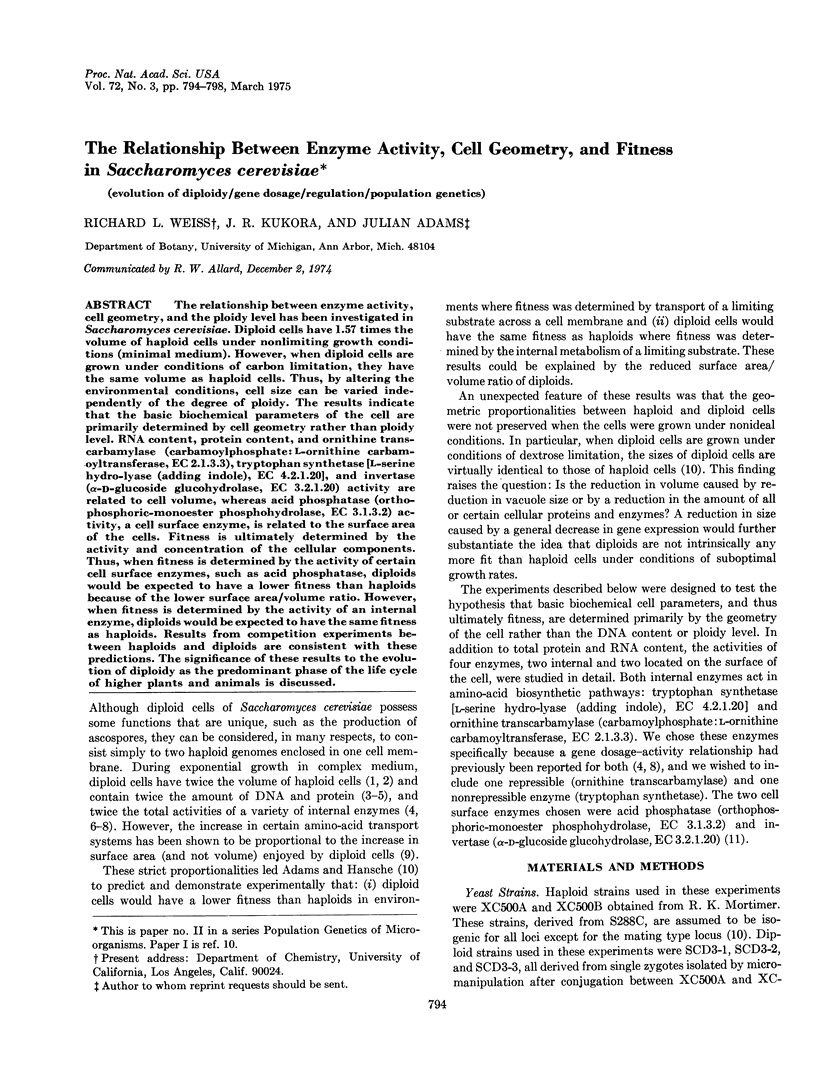
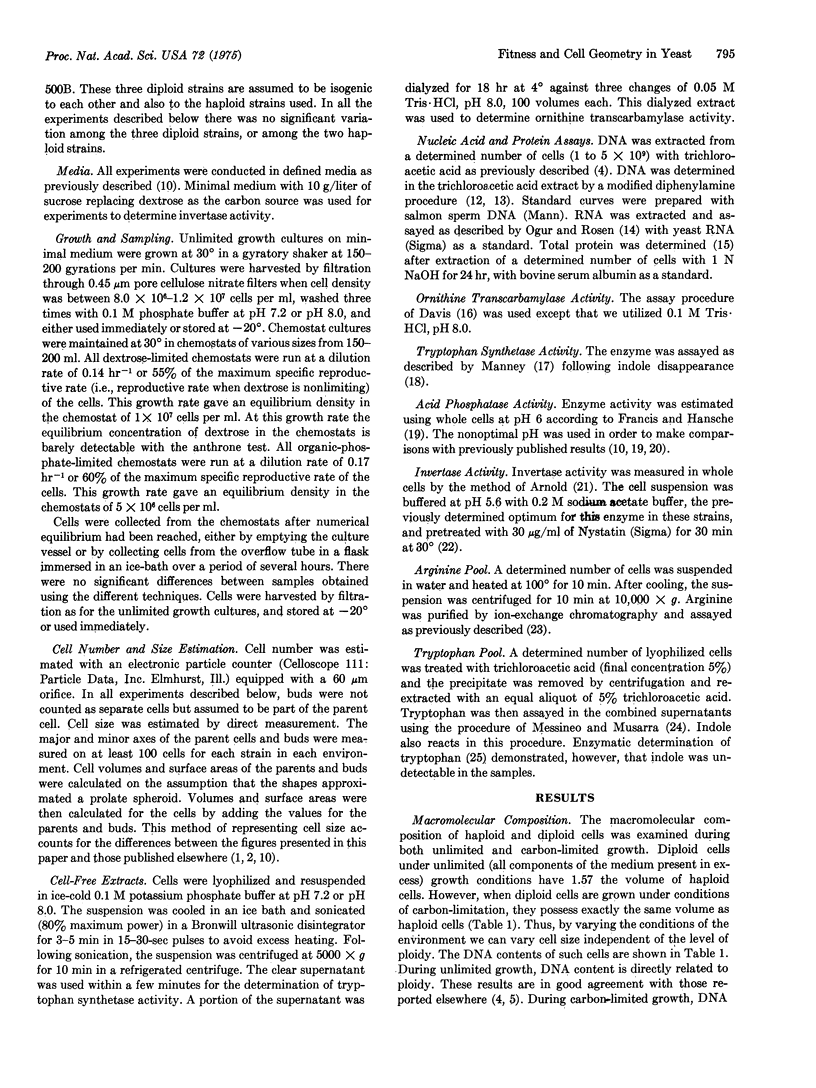
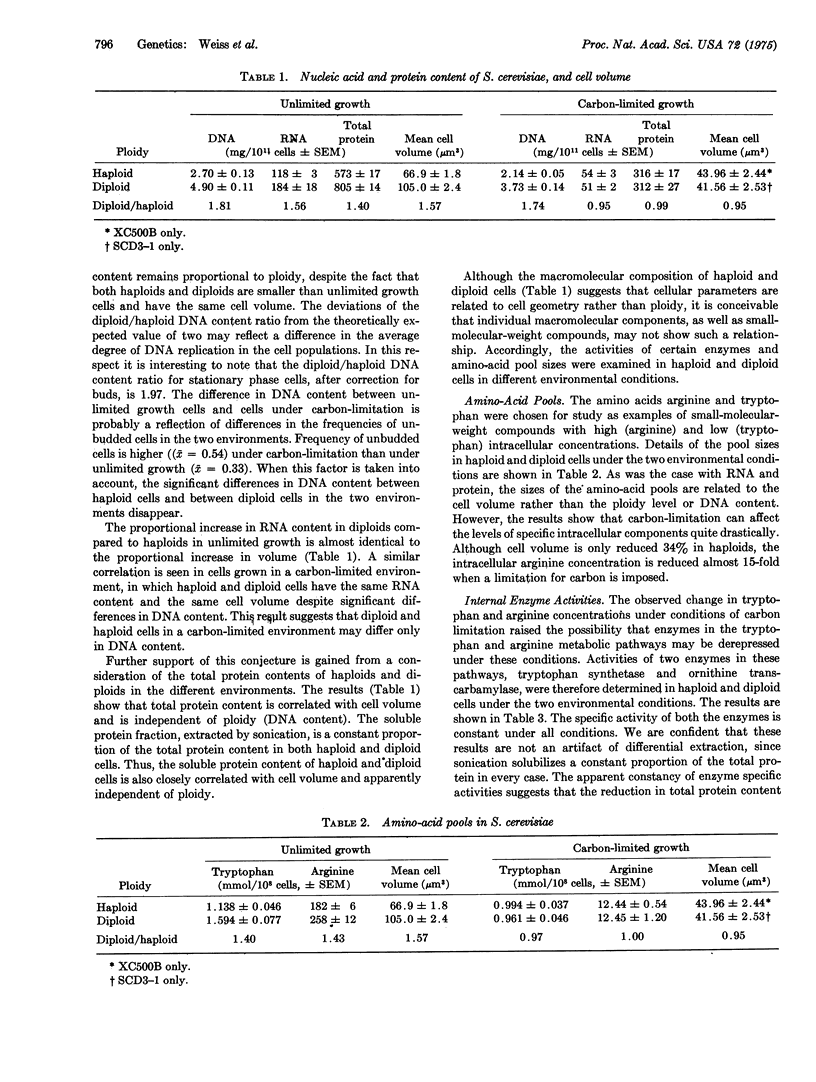
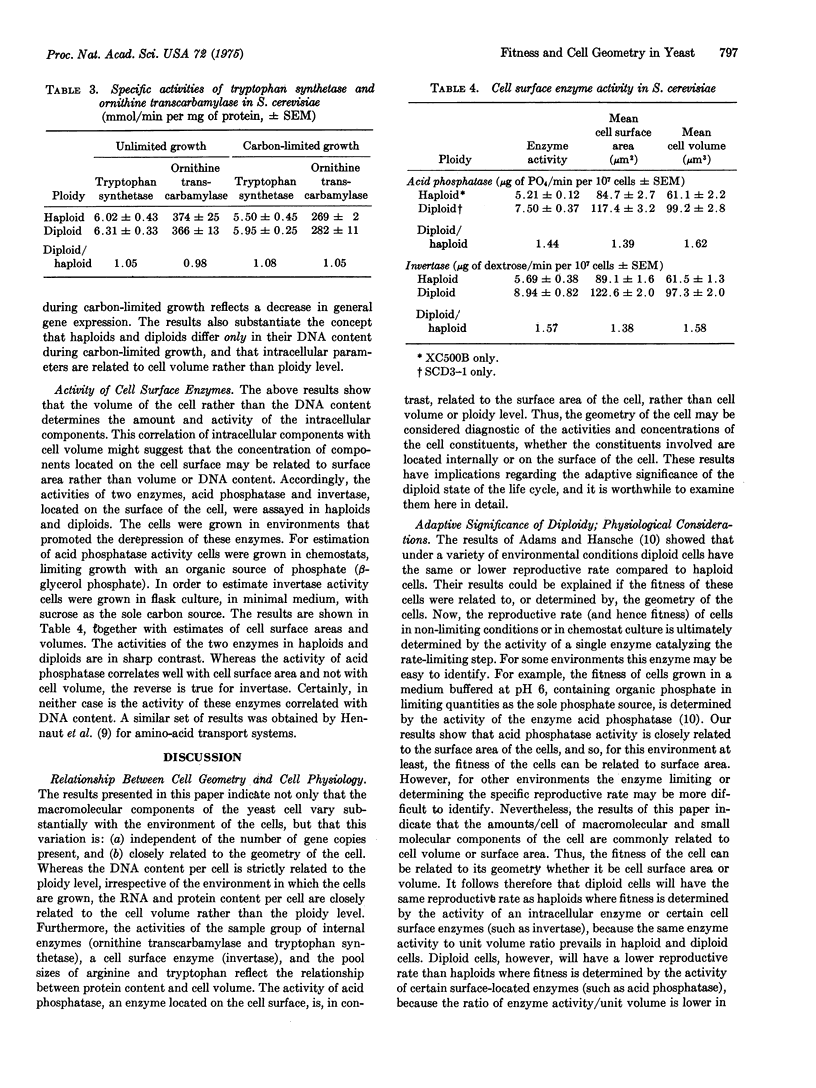
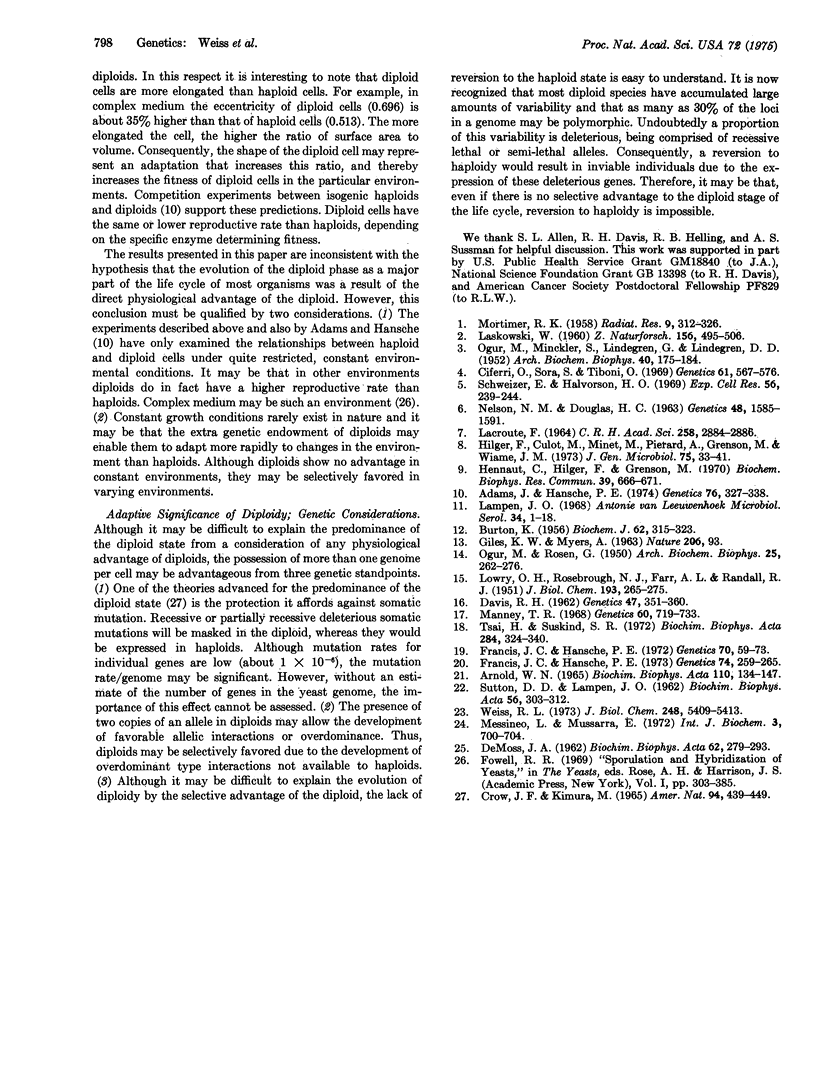
Selected References
These references are in PubMed. This may not be the complete list of references from this article.
- Adams J., Hansche P. E. Population studies in microorganisms. I. Evolution of diploidy in Saccharomyces cerevisiae. Genetics. 1974 Feb;76(2):327–338. doi: 10.1093/genetics/76.2.327. [DOI] [PMC free article] [PubMed] [Google Scholar]
- Arnold W. N. Beta-fructofuranosidase from grape berries. Biochim Biophys Acta. 1965 Oct 25;110(1):134–147. doi: 10.1016/s0926-6593(65)80102-3. [DOI] [PubMed] [Google Scholar]
- BURTON K. A study of the conditions and mechanism of the diphenylamine reaction for the colorimetric estimation of deoxyribonucleic acid. Biochem J. 1956 Feb;62(2):315–323. doi: 10.1042/bj0620315. [DOI] [PMC free article] [PubMed] [Google Scholar]
- Ciferri O., Sora S., Tiboni O. Effect of gene dosage on tryptophan synthetase activity in Saccharomyces cerevisiae. Genetics. 1969 Mar;61(3):567–576. doi: 10.1093/genetics/61.3.567. [DOI] [PMC free article] [PubMed] [Google Scholar]
- DAVIS R. H. Consequences of a suppressor gene effective with pyrimidine and proline mutants of Neurospora. Genetics. 1962 Mar;47:351–360. doi: 10.1093/genetics/47.3.351. [DOI] [PMC free article] [PubMed] [Google Scholar]
- DEMOSS J. A. Studies on the mechanism of the tryptophan synthetase reaction. Biochim Biophys Acta. 1962 Aug 13;62:279–293. doi: 10.1016/0006-3002(62)90041-0. [DOI] [PubMed] [Google Scholar]
- Francis J. C., Hansche P. E. Directed Evolution of Metabolic Pathways in Microbial Populations II. a Repeatable Adaptation in SACCHAROMYCES CEREVISIAE. Genetics. 1973 Jun;74(2):259–265. doi: 10.1093/genetics/74.2.259. [DOI] [PMC free article] [PubMed] [Google Scholar]
- Francis J. C., Hansche P. E. Directed evolution of metabolic pathways in microbial populations. I. Modification of the acid phosphatase pH optimum in S. cerevisiae. Genetics. 1972 Jan;70(1):59–73. doi: 10.1093/genetics/70.1.59. [DOI] [PMC free article] [PubMed] [Google Scholar]
- Hennaut C., Hilger F., Grenson M. Space limitation for permease insertion in the cytoplasmic membrane of Saccharomyces cerevisiae. Biochem Biophys Res Commun. 1970 May 22;39(4):666–671. doi: 10.1016/0006-291x(70)90257-3. [DOI] [PubMed] [Google Scholar]
- Hilger F., Culot M., Minet M., Pierard A., Grenson M., Wiame J. M. Studies on the kinetics of the enzyme sequence mediating arginine synthesis in Saccharomyces cerevisiae. J Gen Microbiol. 1973 Mar;75(1):33–41. doi: 10.1099/00221287-75-1-33. [DOI] [PubMed] [Google Scholar]
- LACROUTE F. R'EGULATION DES ENZYMES DE BIOSYNTH'ESE DE L'URACILE CHEZ LA LEVURE. C R Hebd Seances Acad Sci. 1964 Mar 9;258:2884–2886. [PubMed] [Google Scholar]
- LOWRY O. H., ROSEBROUGH N. J., FARR A. L., RANDALL R. J. Protein measurement with the Folin phenol reagent. J Biol Chem. 1951 Nov;193(1):265–275. [PubMed] [Google Scholar]
- Lampen J. O. External enzymes of yeast: their nature and formation. Antonie Van Leeuwenhoek. 1968;34(1):1–18. doi: 10.1007/BF02046409. [DOI] [PubMed] [Google Scholar]
- MORTIMER R. K. Radiobiological and genetic studies on a polyploid series (haploid to hexaploid) of Saccharomyces cerevisiae. Radiat Res. 1958 Sep;9(3):312–326. [PubMed] [Google Scholar]
- Manney T. R. Evidence for chain termination by super-suppressible mutants in yeast. Genetics. 1968 Dec;60(4):719–733. doi: 10.1093/genetics/60.4.719. [DOI] [PMC free article] [PubMed] [Google Scholar]
- NELSON N. M., DOUGLAS H. C. GENE DOSAGE AND GALACTOSE UTILIZATION BY SACCHAROMYCES TETRAPLOIDS. Genetics. 1963 Dec;48:1585–1591. doi: 10.1093/genetics/48.12.1585. [DOI] [PMC free article] [PubMed] [Google Scholar]
- OGUR M., MINCKLER S., LINDEGREN G., LINDEGREN C. C. The nucleic acids in a polyploid series of Saccharomyces. Arch Biochem Biophys. 1952 Sep;40(1):175–184. doi: 10.1016/0003-9861(52)90085-4. [DOI] [PubMed] [Google Scholar]
- OGUR M., ROSEN G. The nucleic acids of plant tissues; the extraction and estimation of desoxypentose nucleic acid and pentose nucleic acid. Arch Biochem. 1950 Feb;25(2):262–276. [PubMed] [Google Scholar]
- SUTTON D. D., LAMPEN J. O. Localization of sucrose and maltose fermenting systems in Saccharomyces cerevisiae. Biochim Biophys Acta. 1962 Jan 29;56:303–312. doi: 10.1016/0006-3002(62)90567-x. [DOI] [PubMed] [Google Scholar]
- Schweizer E., Halvorson H. O. On the regulation of ribosomal RNA synthesis in yeast. Exp Cell Res. 1969 Aug;56(2):239–244. doi: 10.1016/0014-4827(69)90008-1. [DOI] [PubMed] [Google Scholar]
- Tsai H., Suskind S. R. Enzymic properties of a mutant tryptophan synthase from Neurospora crassa. Biochim Biophys Acta. 1972 Sep 19;284(1):324–340. doi: 10.1016/0005-2744(72)90070-8. [DOI] [PubMed] [Google Scholar]
- Weiss R. L. Intracellular localization of ornithine and arginine pools in Neurospora. J Biol Chem. 1973 Aug 10;248(15):5409–5413. [PubMed] [Google Scholar]


